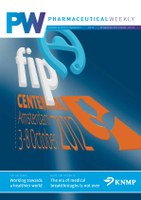
Log in om verder te lezen.
Ik ben mijn wachtwoord vergeten
Alleen abonnees van het Pharmaceutisch Weekblad hebben volledige toegang tot pw.nl. Ga voor meer informatie: abonnement PW aanvragen.
The problems associated with resistant bacteria are rapidly increasing worldwide. The ecosystem is already contaminated. The number of victims of infection is growing, but a solution remains elusive.
The battle to stop falsified medicines entering the supply chain is ongoing. Only last month, the Medicines and Healthcare products Regulatory Agency’s enforcement team seized a haul of counterfeit erectile dysfunction tablets with an estimated value of £140,000. To help tackle the problem the European Commission published the ‘Falsified Medicines Directive’, which could have considerable implications for pharmacists.
Innovation in the field of pharmaceutical medicine is advancing faster than the healthcare system can adapt to it. Personalised medicine is widely acknowledged to be the future. Could the current trend see the return of the compounding pharmacist in our high streets?
Apps on smartphones can play a key role in compliance. Using a game, patients set goals for themselves and share their scores on Facebook. Internet expert Martijn Hulst: “The pharmacy is the ideal place for providing medical apps.”
For a full century, the International Pharmaceutical Federation (FIP) has brought together pharmacists and pharmaceutical scientists from around the world. The goal: to advance pharmacy practice and science so that they may ensure safe, cost-effective use of medicinal products.
Better diagnostic testing allows tailored therapy for an increasing number of diseases. This has led to a growing number of conditions classified as ‘orphan diseases’. A welcome source of income for the pharmaceutical industry, but a growing expense for society. It’s time for a change of course.
Preface by the Chairman of the Royal Dutch Pharmacist's Association
The long-term effects of ADHD medication are currently under investigation. There are concerns about psychiatric side effects and the cardiovascular safety of this medication. There have even been reports of deaths.
The era of groundbreaking inventions in the field of pharmacotherapy seems over, but there have recently been some giant leaps in two areas, type 1 diabetes and oncology.
Tens of thousands of pills and capsules are ground or broken up every day in order to mix them with yoghurt or soft drinks. The reason: they are either too large or have too rough a surface to be able to swallow them easily. Importantly, not all medicines may be processed.
Medicine shortages are a persistent and global problem. Preferential policy is only part of the cause. Authorities are looking for a solution, but their powers are limited. And yet, measures have proven effective.
© 2025, Pharmaceutisch Weekblad